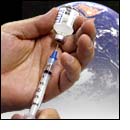 |
During influenza epidemics bacterial complications such as pneumonia are very common, especially in elderly persons and in other high-risk groups. For people belonging in one of these priority groups vaccination is generally recommended.
A flu vaccine can be given to anyone who wants to avoid the flu, unless the person belongs to the group of those who should not receive the influenza vaccine.
|
Inactivated influenza vaccine is recommended for persons in the following priority groups:
- all children aged 6–23 months;
- adults aged ≥65 years;
- persons aged 2–64 years with underlying chronic medical conditions;
- all women who will be pregnant during the influenza season;
- residents of nursing homes and long-term care facilities;
- children aged 2–18 years on chronic aspirin therapy;
- health-care workers involved in direct patient care; and
- out-of-home caregivers and household contacts of children aged <6 months.
Persons in the priority groups identified above should be encouraged to search locally for vaccine if their regular health-care provider does not have vaccine available. Children aged <9 years require 2 doses of vaccine if they have not previously been vaccinated.
All children who are at high risk for complications from influenza, including those aged 6–23 months, should be vaccinated with a first or second dose, depending on vaccination status. However, doses should not be held in reserve to ensure that 2 doses will be available. Instead, available vaccine should be used to vaccinate persons in priority groups on a first-come, first-serve basis.
Persons in the following groups should not receive influenza vaccine without the recommendation of their physicians:
- persons with a severe allergy (i.e., anaphylactic allergic reaction) to hens' eggs; and
- persons who previously had onset of Guillain-Barré syndrome during the 6 weeks after receiving influenza vaccine.
Source: Centers for Disease Control and Prevention USA
|
|

